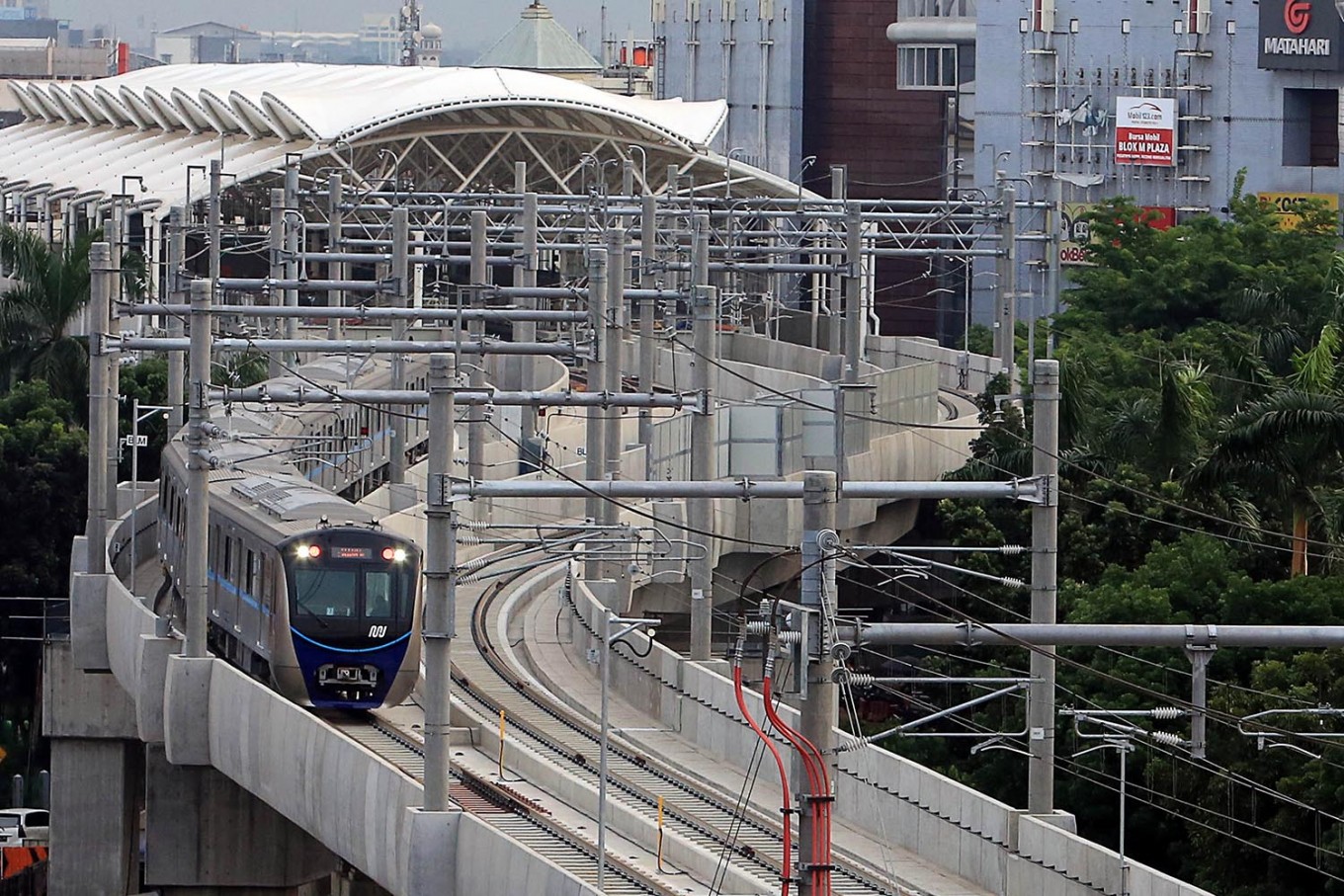Second MRT construction phase expected to begin this month
The company pushed back the groundbreaking ceremony to January from the initial plan of holding the ceremony in December.
Change Size
 An MRT train passes over Jl. Sisingamangaraja, South Jakarta, during a trial run on Tuesday, October 23, 2018. (JP/Seto Wardhana)
An MRT train passes over Jl. Sisingamangaraja, South Jakarta, during a trial run on Tuesday, October 23, 2018. (JP/Seto Wardhana)
P
T Mass Rapid Transit (MRT) Jakarta, which will operate the first rapid transit system in Indonesia, is upbeat on commencing the development of the second phase of the MRT mid-January, despite challenges to find a location for the train’s depot.
The company pushed back the groundbreaking ceremony to January from the initial plan of holding the ceremony in December.
“The [groundbreaking] will be in January. Although the Jakarta administration has yet to decide on the location of the train’s depot, work can still go ahead,” MRT Jakarta president director William Sabandar said on Tuesday.
He expected the service connecting Hotel Indonesia traffic circle in Central Jakarta to Kota station in West Jakarta to be completed in 2024 before the service is fully operational in the first quarter of 2025.
Work will begin by constructing a receiving substation (RSs) at the National Monument (Monas) compound in Central Jakarta, which will be constructed by construction firm PT Trocon Indah Perkasa at a cost of Rp 21.7 billion (US$1.87 million).
The RSs will be developed 20 meters underground to power the service.
Initially, the plan was to connect the 8.3 kilometer Hotel Indonesia traffic circle to Kampung Bandan in North Jakarta route. However, land acquisition problems hindered the process, prompting the administration to find an alternative location, which will also be designed as the train’s depot.
William said the city administration had decided to make Kota the final station for the second stage of the massive project. The administration also announced that the possible station to replace Kampung Bandan will be near the BMW multipurpose stadium, which is under construction.
When operational, MRT Jakarta has promised that it will take passengers no longer than 15 minutes to travel from Hotel Indonesia traffic circle to its final destination, running through seven stations, namely Sarinah, Monas, Harmoni, Sawah Besar, Mangga Besar, Glodok and Kota.
The work to build the RSs should have begun in December last year, but the company failed to find a qualified firm during the tender process. Of the five applicants, none met all the requirements, particularly on the provision of equipment.
This particular project, dubbed construction package (CP) 200, is specifically allocated for an Indonesian firm as part of a loan agreement between the administration and the Japan International Cooperation Agency (JICA) to transfer technology and knowledge to an Indonesian company.
There are seven CPs for the MRT’s second phase and MRT Jakarta expects the tender process to be completed by 2020.
MRT Jakarta construction director Silvia Halim said the construction of the second phase would be more challenging compared to the first phase that spans 16 kilometer linking Lebak Bulus in South Jakarta to Hotel Indonesia traffic circle.
The budget for the project that stood at Rp 22.5 trillion, loaned from JICA, is also bigger than the first phase even though the distance is shorter. She cited softer soil conditions in the northern part of Jakarta and that phase two is fully underground as the reason for the cost.
“It will be developed near crucial areas, namely the Bank Indonesia building and Presidential Palace complex, so it requires extra caution,” she said. “Along the line, there are also some historic buildings.”
William said his office was also working on developing a basic engineering design for the West-East line, which will connect Balaraja in Tangerang, Banten, to Cikarang in Bekasi, West Java.
The MRT is expected to encourage motorists to use public transportation as the administration has set an ambitious target to make 60 percent of travel in the capital by public transportation from the current 24 percent.
This article was originally published in The Jakarta Post's print edition on Jan. 3, 2019, with the title "Second MRT construction phase expected to begin this month".










